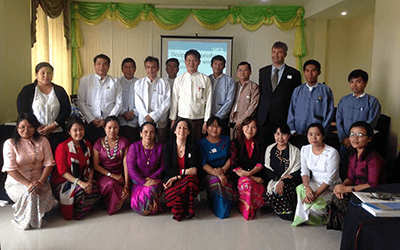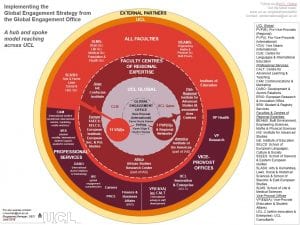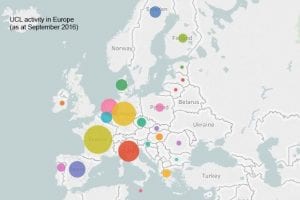Supporting policy development and education practices in Myanmar
By ucypnde, on 13 November 2017

Ministry of Education officials in Nay Pyi Taw with UCL’s Prof Marie Lall and Jonathan Dale after the workshop
This past summer, Professor Marie Lall, UCL’s Pro-Vice-Provost for South Asia, travelled to Yangon and Nay Pyi Taw, Myanmar, with Jonathan Dale from UCL Institute of Education’s London Leadership Centre.
In Yangon they delivered a two-day workshop on school leadership to 90 head teachers from the state, monastic, ethnic and private sectors. A few academic colleagues from Yangon and Mandalay University, as well as some teacher trainers from teacher education colleges, also attended. The Myanmar partner ‘Smile Education’, a local NGO, arranged for participants to come from across the country including some remote and conflict-affected areas.
In Nay Pyi Taw Professor Lall and Mr Dale delivered a one-day workshop on policy development to 18 Ministry of Education (MoE) officials. All were senior civil servants, most holding the post of director general of their departments. After the workshop, they were asked to do an interactive briefing with government MPs sitting on the education select committees of the Lower and Upper Houses of Parliament.
Professor Lall said: “Myanmar is in a reform phase and there is a great need for capacity building at government level. I have worked with different stakeholders across the board for over a decade. However, I have never worked directly with the MoE till now and it’s unusual to have access to the heads of all departments of one ministry. The event was a resounding success.”
Since the country opened up in 2012, it has been awash with aid agencies and universities who offer help and capacity building. However, UCL’s advantage is that Professor Lall has worked in the country since 2004/5 and therefore has a reasonably good understanding of the needs that arise out of the reform process within the field of education. “UCL’s unique position can be different in that we meet actual needs without trying to impose programmes that have little relevance to the complicated local context,” added Prof Lall.
As a consequence of this activity, Professor Lall and Mr Dale recently won a new £150,000 British Council grant focused on ‘Supporting the Transformation of Higher Education in Myanmar’.
These efforts are part of UCL’s growing engagement with Myanmar that aims to build capacity across the public sector as the country continues its reform process.
If you would like to learn more about UCL’s work in Myanmar, please contact Professor Lall at m.lall@ucl.ac.uk.
 Close
Close




